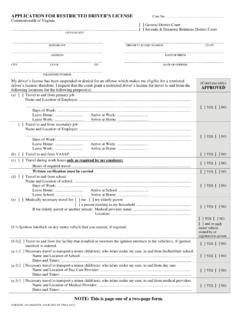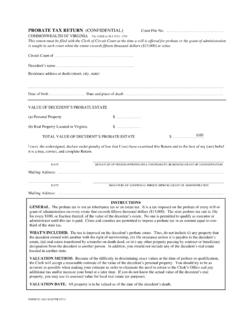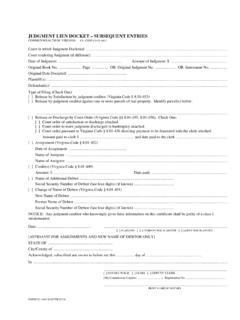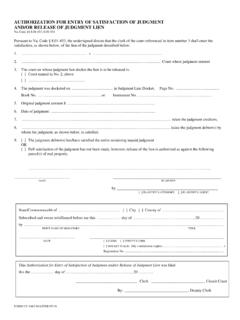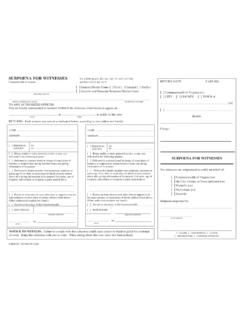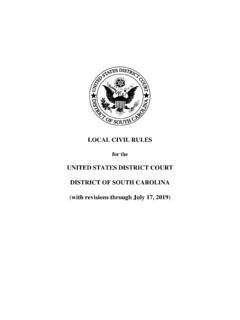Transcription of The Juvenile and Domestic Relations District Court
1 The Juvenile and Domestic Relations District Court I. General Information The Juvenile and Domestic Relations District Court handles cases involving: Juveniles accused of delinquent acts, traffic infractions or status offenses Children in need of services or supervision Children who have been subjected to abuse or neglect, or abandoned Children whose custody, visitation, support or parentage is a subject of controversy Children in regards to whom relief of custody or termination of parental rights is sought Children in foster care and who are subjects of entrustment agreements Minors seeking emancipation or work permits Family or household members who have been subjected to or accused of abuse Adults accused of child abuse or neglect, or of offenses against a family or household member Spouses seeking support after separation Enforcement of support orders Court -ordered rehabilitation services Court consent for certain medical treatments In Virginia, the terms listed below are defined as follows: Juvenile : Any child under the age of eighteen.
2 Delinquent: A Juvenile who has committed an act that would be a crime if committed by an adult. Child in Need of Services: A Juvenile whose behavior, conduct or condition presents or results in a serious threat to the Juvenile 's well-being and physical safety of another person. Child in Need of Supervision meets one of these criteria: 1. A Juvenile subject to mandatory school attendance, is habitually absent without valid excuse. 2. A Juvenile who remains away from his family or guardian. 3. A Juvenile who escapes or remains away from a residential care facility ordered by the Court . Child Abuse and Neglect: 1. A caregiver who creates or inflicts a physical or mental injury upon a child. 2. A caregiver who creates the child to be at risk of physical or mental injury. 3. A caregiver who refuses to provide for Juvenile 's health and well-being. Juvenile and Domestic Relations District courts differ from other courts in their duty to protect the confidentiality and privacy of juveniles and their families who have legal matters before the Court .
3 In addition to protecting the public and holding delinquent juveniles accountable, the Court considers services needed to provide for rehabilitation. As a District Court , this Court does not conduct jury trials. Also, like all other courts in the Commonwealth, protection of victim rights and constitutional safeguards remain the same. Court Clerk Each Juvenile and Domestic Relations District Court has a clerk's office that processes all case papers, keeps Court records and provides information to the people involved in a case (to the extent permitted by law). Anyone wishing to make a witness appear at a Court hearing may request the issuance of a subpoena (a document used to require a person to come to the Court hearing) at the Court clerk's office. While Court personnel are not permitted to offer legal assistance, they can provide general procedural information. Because of confidentiality laws, the clerk's office can often only provide very limited information about a case and only to those people involved with the case.
4 Court Service Unit Associated with the Juvenile and Domestic Relations District Court is a Court service unit, sometimes called the Juvenile Probation department, which serves the Court and facilitates the supervision, rehabilitation and treatment as needed by those who come before the Court . The Court service unit's essential functions include: Intake. Reviews all complaints and determines whether there are enough facts to involve the Court . If so, the intake officer may either proceed informally to make practical adjustments without filing a petition or may authorize the filing of a petition to bring the matter before the judge, and may effect the placement in secure detention of those juveniles whose present offense requires such security prior to a detention hearing by a Juvenile and Domestic Relations District Court judge. Intake does not handle those criminal charges against adults which are started by obtaining a warrant from a magistrate.
5 Investigation. Conducts all background studies required by the judge and regulations promulgated by the Virginia Board of Juvenile Justice, such as examination of a Juvenile 's familial, social and educational history. Such studies may be used by the Court as a factor in determining the disposition appropriate to the subject and by the probation staff in the formulation of a services and supervision plan. Probation. Supervises delinquent juveniles and children in need of services released into home probation and supervises adults released on probation in support and other cases involving the defendant's relation with family members and individuals to whom he has a support duty. Parole. Supervises and provides community based case management services to juveniles in direct state care and those recently released from state institutional care. Residential Care. Supervises juveniles being held in detention, shelter care and post dispositional probation facilities.
6 In most localities, the staff of these facilities are employees of the localities served by the Court and work cooperatively with the staff of the respective Court service unit. The intake officer can further explain the procedures of the Juvenile and Domestic Relations District Court at intake. Other Agencies Welfare and social service agencies are in frequent contact with the Court in certain types of cases. They perform the initial investigation in abuse and neglect cases. Juveniles may be committed to such agencies when they are removed from home. Other agencies provide such services as may be ordered by the judge. Lawyers The right to be represented by a lawyer in this Court extends to: Juveniles involved in delinquency cases Juveniles alleged to be in need of services Juveniles alleged to be in need of supervision Abused and neglected juveniles A Juvenile who is the subject of an entrustment agreement, a request for relief of custody, or a parentage controversy Adults before the Court on criminal charges Adults faced with loss of their parental rights or charged with child abuse or neglect All other persons whom the Court decides require a lawyer's services The Court appoints a guardian ad litem (a lawyer who represents the Juvenile 's best interests) to represent all juveniles alleged to be abandoned, neglected, abused or dependent who are the subject of either an entrustment agreement (in which the parents give up their parental rights and transfer care and custody of the Juvenile to an agency)
7 , or a Court proceeding to terminate residual parental rights (for all rights and responsibilities to the Juvenile ), or juveniles whose parents desire to be relieved of care and custody of the Juvenile . Adults and juveniles may waive attorney representation. Juveniles and their parents must knowingly waive representation in writing. The judge must agree that this waiver is consistent with the interests of the child. If the Juvenile is charged with an offense that is a felony, then the Juvenile must consult with an attorney and both must sign a waiver to be filed with Court records of the case. The Court must find that this waiver is made free and voluntary. Those who want to hire a lawyer and have not had time to do so must file a motion asking the Court for a continuance before their Court date. This must be done before the judge hears evidence in the case. Court personnel are not lawyers and are not permitted or allowed to offer legal advice.
8 Legal questions should be addressed to competent attorneys only. Petition, Summons, Subpoena and Warrant A petition is a legal document containing the written statement that brings the case involving a Juvenile into Court . The petition contains facts concerning the case and requests a hearing to determine the truth of these facts and to take whatever action is appropriate and permitted by law. A summons is a legal document requiring a person to appear in Court at the date and time stated on the summons. The petition is delivered with the summons to those people who are required to be in Court as parties in the case. No petition is required when a Juvenile is arrested and released on a summons written by an arresting officer. A subpoena is a legal document delivered to witnesses who are required to be in Court , telling them when and where they are required to appear. A warrant is a legal document accusing a person of committing crimes, requiring that the person be arrested, be brought before a magistrate for a pretrial release (bail) hearing, and be required to appear in Court to answer the accusations.
9 When Called to Court All persons required to appear before the Juvenile and Domestic Relations District Court should arrive at the time and place stated on the petition, summons, bail form or subpoena. It is important that everyone involved in a case be ready when the case is called into the courtroom. Though the wait may seem long, everyone must remain until the case is called; to do otherwise is a criminal offense. The Court does not have child care services; therefore, the only children who should be brought to Court are those children involved in the case or whose presence has been requested or required by the Court , an attorney or a probation officer. Privacy and Confidentiality Court hearings are open to the public for adults and juveniles who have petitions or warrants alleging that the Juvenile was at least 14 years old at the time of the offense and that the offense would be a felony if committed by an adult.
10 However, the judge may specifically close the hearing for good cause shown and by a written Court order. Juveniles less than 14 years of age have confidential Court records and closed hearings for misdemeanors. If juveniles less than 14 years of age are charged with traffic offenses, they may have an open trial if they request. Unless a Juvenile is over 14 and found guilty of a felony offense, the Juvenile Court records are not open to the public. II. Juvenile Delinquency and CHINS Cases; Adult Criminal Cases Detention or Shelter Care A Juvenile may be taken into custody if one of the following applies: 1. A judge, clerk at judge's direction or intake officer issues a detention order requiring the Juvenile to be taken into custody. 2. A Juvenile is alleged to be a CHINS and there is clear and substantial danger to the child's life or health and this is necessary for the child's appearance before the Court .

